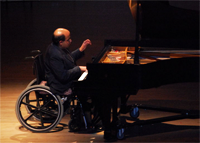Música... para Curar ou Desabilitar?: “Terapia para Quem?”
DOI:
https://doi.org/10.15845/voices.v14i3.793Palavras-chave:
disability, selfhood, music therapy, Disability Studies in Music, reflexivity, accessibility, performanceResumo
Este artigo interroga: “Qual o papel de uma perspectiva de Estudos da Deficiência em musicoterapia?” E “Qual o papel da musicoterapia apartir de uma perspectiva de Estudos da Deficiência?”. Eu elucido algumas das implicações de um encontro entre Estudos da Deficiência em Música e Musicoterapia, e sua recíproca, e os possíveis papéis de conflito que cada campo pode desempenhar em relação ao outro. Devido à minha própria experiência e interesses de pesquisa, haverá uma ênfase proposital na primeira pergunta, que é em quê os Estudos da Deficiência podem contribuir para a teoria e a prática da Musicoterapia.
Downloads
Publicado
2014-10-20
Como Citar
Honisch, S. (2014). Música. para Curar ou Desabilitar?: “Terapia para Quem?”. Voices: A World Forum for Music Therapy, 14(3). https://doi.org/10.15845/voices.v14i3.793
Edição
Seção
Invited Submission - Special Issue
Licença
Articles published prior to 2019 are subject to the following license, see: https://voices.no/index.php/voices/copyright

